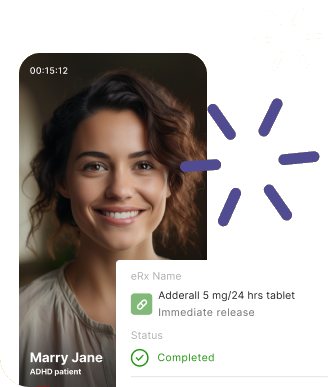Highlights
- You may be able to get an online prescription for Qsymia after a consultation with a licensed healthcare provider, if they determine it is an appropriate treatment for you.
- Take Qsymia in the morning, with or without food. Taking it early can help reduce the risk of insomnia, a possible side effect.
- Because Qsymia can cause serious harm to an unborn baby, it’s important to confirm you’re not pregnant before starting and during treatment.
Losing weight is hard, and keeping it off can be even harder. In fact, only about
Find out what weight loss option can be right for you: consult a licensed medical provider online.


What Is Qsymia?
Qsymia is a prescription medication used to help with weight loss in people with obesity, or certain adults who are overweight. It contains a combination of two different medications (phentermine and topiramate) and comes as an extended-release capsule you take by mouth.
Qsymia helps with weight loss by
Qsymia works best when combined with a reduced-calorie diet and increased physical activity. In
Who Is Qsymia For?
Qsymia is FDA-approved for:
- Adults with a body mass index (BMI) of 30 or higher.
- Adults with a BMI of 27 or higher and at least one weight-related condition, such as high blood pressure, type 2 diabetes, or high cholesterol.
- Children ages 12 and up with obesity (BMI ≥ 95th percentile for age and sex).
Before prescribing Qsymia, your healthcare provider will review your medical history and current medications to make sure it is a safe treatment option for you. This includes checking for conditions like uncontrolled high blood pressure, pregnancy, mood disorders, or kidney problems. If you’re able to become pregnant, you’ll need a negative pregnancy test before starting treatment and likely monthly tests during therapy, along with the use of effective birth control.
How to Get a Prescription for Qsymia Online
Step 1: Sign Up and Book an Appointment
Getting started is simple. Create an account on MEDvidi, complete a few basic health forms, and book a virtual appointment with a licensed healthcare provider at a time that’s convenient for you.
Step 2: Meet With a Healthcare Provider
You will have a video visit with a provider licensed to practice in your state. They will talk with you about your physical health, emotional well-being, and weight loss goals. Together, you’ll discuss a personalized plan and see if you need to get prescribed Qsymia.

Step 3: Get Your Prescription and Start Treatment
If your healthcare provider determines that Qsymia is right for you, they’ll send the prescription electronically to a certified pharmacy. You’ll also get clear instructions on when and how to get your prescription. It’s important to take Qsymia exactly as your provider prescribes. Never change your dose or take it more often than directed.
Step 4: Stay on Track With Follow-Ups and Refills
Your provider will want to schedule regular follow-up appointments to track your health dynamics, adjust your dose, and monitor for any side effects. With MEDvidi, staying on track with your medication is easy, thanks to flexible virtual follow-up appointments that fit your schedule. During these check-ins, you and your doctor can discuss your weight loss plan and address any refill needs you may have.
Get all your questions about weight loss answered and receive a prescription for Qsymia online if appropriate.


How to Take Qsymia
Qsymia is taken once daily, preferably in the morning, to reduce the risk of insomnia. You can take it with or without food. Doctors typically prescribe a starting dosage of 3.75 mg/23 mg once daily for the first 14 days and then adjust it gradually based on your response.
Do not stop Qsymia suddenly, as this may increase the risk of seizures, even in patients without a history of seizures or epilepsy. If your healthcare provider recommends discontinuing Qsymia, they’ll advise you how to gradually reduce your dose to minimize withdrawal effects.
If you miss a dose, skip it and go back to your regular dosing schedule the following day. Avoid doubling the dose or taking additional doses to make up for the missed dose.
Side Effects of Qsymia
Most side effects of Qsymia are mild and may improve over time. They occur more frequently at higher doses of Qsymia. The most common
- Numbness or tingling in hands, arms, feet, or face
- Dizziness
- Change in taste
- Insomnia (trouble sleeping)
- Constipation
- Dry mouth
- Problems with concentration or memory
This list of side effects is not comprehensive; and Qsymia can also cause serious adverse reactions. Some people may experience suicidal thoughts or changes in mood. It can also cause serious eye problems, like sudden vision loss, and may increase the risk of kidney stones. Some people may develop irregular or fast heartbeats. If you have type 2 diabetes and take medications like insulin or sulfonylureas, Qsymia can also raise your risk of low blood sugar (hypoglycemia). Seek medical attention immediately if you experience serious side effects.
If you’re experiencing suicidal or self-harming thoughts and require immediate assistance, contact a crisis hotline, such as 911, 988 suicide & crisis lifeline (toll-free), or Samaritans (116-123 or via chat).
Warnings and Precautions
While Qsymia can be helpful for weight loss, it must be used under the care of a licensed healthcare provider. Never buy Qsymia online without a prescription or from unlicensed pharmacies. Unregulated products may be counterfeit, contaminated, or contain incorrect dosages, putting your health at risk.
Below are some important safety considerations to be aware of before and during treatment with Qsymia:
- Serious birth defects. Qsymia can cause serious birth defects, so women who can become pregnant should use effective birth control and take regular pregnancy tests.
- Increased heart rate. Qsymia can increase your heart rate, so heart rate and blood pressure should be monitored regularly, especially if you have a history of heart conditions or are taking blood pressure medications.
- Mood changes. Some people may experience mood changes, depression, or suicidal thoughts, particularly if they’ve had mental health issues in the past.
- Eye problems. If you experience symptoms such as sudden vision changes or eye pain, stop taking Qsymia and get immediate medical attention.
- Trouble sleeping. Qsymia may also cause difficulty sleeping, as well as trouble with memory, concentration, or speech, especially with fast dose increases.
- Slowed height growth. In teens, Qsymia may slow height growth, so growth should be monitored during treatment.
- Low blood sugar. Weight loss can lead to lower blood sugar. If you are using insulin or taking medications for type 2 diabetes, you may have an increased risk of low blood sugar.
- Change in blood chemistry. There is a risk of metabolic acidosis (change in blood chemistry), which can cause symptoms like tiredness and shallow breathing and may lead to kidney or bone issues if not treated.
- Decreased sweating. Some people taking Qsymia have reported reduced sweating, which can lead to overheating, particularly during exercise or in hot weather.
- Kidney stones. Qsymia may also affect kidney function and increase the risk of kidney stones, so staying hydrated is important.
- Severe skin reactions. Serious skin reactions have been reported in patients taking Qsymia. If you notice a skin rash, stop taking Qsymia and contact your healthcare provider.
Who Should Not Take Qsymia
Qsymia isn’t right for everyone. It should not be used during pregnancy due to the risk of birth defects. Because of this risk, Qsymia is only available through the Qsymia REMS program.

Qsymia is also not recommended for people with:
- Glaucoma
- Overactive thyroid (hyperthyroidism)
- Uncontrolled high blood pressure
- Have had a recent stroke or heart attack
- Allergies to phentermine, topiramate, or similar medications
If you have a history of depression, mood problems, or suicidal thoughts, it’s important to tell your doctor, as Qsymia may affect your mood or mental health. Also, if you have kidney stones or seizure disorders, your doctor will decide whether this medication is safe for you. However, be sure to share other details of your health history as well, because they may also affect the choice of treatment.
Interactions With Other Medications
Qysmia interacts with several medications. Before starting Qsymia, be sure to let your healthcare provider know about any other medications, supplements, or herbs you’re taking.
- Birth control pills. Spotting may occur when Qsymia is taken with birth control pills. However, the effectiveness of birth control is not reduced.
- Central nervous system (CNS) depressants, such as opioids, alcohol, or sleep aids, can increase the risk of dizziness or confusion when taken with Qsymia.
- Monoamine oxidase inhibitors (MAOIs), such as selegiline (Emsam), tranylcypromine (Parnate), and phenelzine (Nardil), can cause dangerously high blood pressure if taken within 14 days of Qsymia.
- Amitriptyline blood levels may be increased when taken with Qsymia, increasing the risk of side effects from amitriptyline.
- Blood pressure medications may not be as effective when taken together with Qsymia.
You should also talk with your doctor or pharmacist before taking other weight loss medications, dietary supplements, or stimulants during Qsymia treatment.
Your weight loss management plan starts here. Schedule an online consultation for personalized care.


Cost and Insurance Coverage
The cost of Qsymia varies. Without insurance, a 30-day supply typically ranges from $230 to $250 but can be different depending on your location and the specific pharmacy you choose. Using a discount card, such as GoodRx or SingleCare, may reduce it to as low as $80.
Recently, a generic version of Qsymia was approved and is expected to be available in pharmacies soon. Generic medications are typically more affordable and offer the same active ingredients and effectiveness as the brand-name version.
Insurance coverage can help reduce the cost, but coverage will vary by plan. It’s a good idea to check with your insurance provider to see what’s covered.
The manufacturer of Qsymia offers several ways to save on your prescription:
- The Qsymia savings card offers various discounts, depending on whether you have insurance or not.
- The Qsymia Engage Program is a free support program that offers a discount on brand-name Qsymia when you use the home delivery service directly from the manufacturer.
Alternatives for Weight Loss
Qsymia isn’t the only FDA-approved medication for weight management. Other options include Contrave, Wegovy, Saxenda, and Zepbound, each with unique benefits and considerations.
- Contrave is an oral medication taken twice a day. It combines bupropion and naltrexone. Contrave helps reduce appetite and food cravings and may be a good option for people who prefer pills over weight loss injections and don’t have a history of seizures or certain mental health conditions.
- Wegovy and Saxenda are both injectable medications that contain GLP-1 receptor agonists, which help regulate appetite and slow digestion. Wegovy is injected once a week, while Saxenda is a daily injection. These are often used in people with obesity or weight-related health conditions and may offer significant weight loss for those who can tolerate injections. Wegovy is also
approved[7] to reduce the risk of major cardiovascular events in adults with obesity or overweight and heart disease. - Zepbound is another injectable option, similar to Wegovy but containing tirzepatide, which targets two hormones involved in appetite regulation. It’s injected once weekly and has shown up to a 20% weight loss in clinical trials. Individuals with obesity and insulin resistance may
benefit[8] the most from using Zepbound.
The best weight loss medication depends on your health, preferences, and goals. A licensed provider can help determine which option is the safest and most effective one for you.
Bottom Line
Medications like Qsymia offer an additional tool to support your efforts when diet and exercise alone aren’t enough for weight loss. Qsymia works by controlling hunger and cravings and is most effective when used as part of a long-term plan under medical supervision. MEDvidi’s telehealth service offers virtual visits with health professionals who can provide a Qsymia prescription online if they determine it’s an appropriate option for you. Book your appointment today to have an online weight loss consultation.
Frequently Asked Questions
Do you need a prescription for Qsymia?
Yes. Qsymia is a controlled substance and requires a prescription from a licensed healthcare provider. You cannot get Qsymia over-the-counter.
Who can prescribe Qsymia?
Doctors, nurse practitioners (NPs), and physician assistants (PAs) licensed in your state may be able prescribe Qsymia. Online doctors can prescribe Qsymia if they are licensed in your state and are authorized to prescribe medication online.













